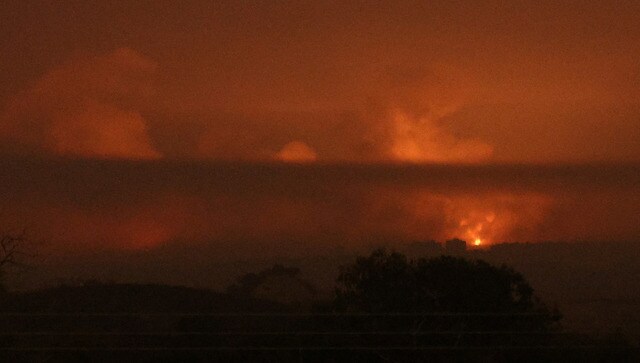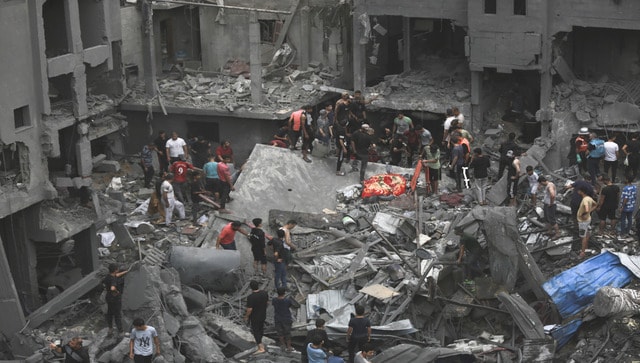Inside Israel’s ‘expanding’ ground operations in Gaza
Inside Israel’s ‘expanding’ ground operations in Gaza

Israel has widened its air and ground attacks on Gaza, increasing bombardment and artillery fire into the Palestinian enclave on Friday night (27 October). This has reportedly severed communications and caused a near-blackout in the Hamas-ruled Gaza Strip.
The Israel Defense Forces (IDF) claimed on Saturday (28 October) that its fighter jets struck the Palestinian group’s “head of aerial array” overnight, who it said was “responsible for Hamas’ UAVs, drones, paragliders, aerial detection and defence” in a post on X.
Overnight, IDF fighter jets struck Asem Abu Rakaba, the Head of Hamas’ Aerial Array.
Abu Rakaba was responsible for Hamas’ UAVs, drones, paragliders, aerial detection and defense.
He took part in planning the October 7 massacre and commanded the terrorists who infiltrated…
— Israel Defense Forces (@IDF) October 28, 2023
The Israeli military said its 100 jets have hit 150 underground Hamas targets in Gaza, which as per The Guardian is the “heaviest aerial bombardment” of the Strip yet.
Hamas said earlier today its fighters were ready to take on Israel’s attacks with “full force”. “The Al-Qassam brigades and all the Palestinian resistance forces are completely ready to confront (Israel’s) aggression with full force and frustrate its incursions,” Reuters quoted the Palestinian group’s statement as saying.
“(Israeli prime minister Benjamin) Netanyahu and his defeated army will not be able to achieve any military victory,” the statement added.
How has Israel escalated its attack on Gaza? How is the narrow enclave bearing the brunt of the West Asian nation’s war with Hamas? We explain.
Israel ‘expands’ ground operations
The IDF is “expanding ground operations” in the Gaza Strip, Israeli military spokesman Rear Admiral Daniel Hagari announced Friday evening.
“In addition to the attacks carried out in the last few days, ground forces are expanding their operations tonight,” he said, stoking speculations of the beginning of a long-expected ground invasion of Gaza, as per Reuters.
The Israeli military spokesman further said that the ground troops were “expanding their activity” and “acting with great force … to achieve the objectives of the war”, reported Associated Press (AP).
Video activity of the IDF Ground Forces in Gaza. pic.twitter.com/FWt0pFO53q
— Israel Defense Forces (@IDF) October 28, 2023
Hagari said the Israeli air force was carrying out extensive strikes on Hamas-built tunnels and other infrastructure in the enclave. His remarks came as heavy shelling lit up skies in Gaza, according to Reuters. The bombardment continued well into Saturday, reported AP.
Speaking to CNN, Israeli premier Netanyahu’s senior adviser, Mark Regev, said that “expansion” of ground operations in Gaza implies Israel’s army is “beefing up the pressure on Hamas,” adding “that pressure will increase and continue to increase until we achieve our goal”.
“They (Hamas) will continue to be on the receiving end of our military blows until we have dismantled their military machine and dissolve their political structure in Gaza,” he reportedly told Fox News. “When this is over, Gaza will be very different.”
According to AP, the Hamas media center reported heavy clashes with Israeli forces in many places, including east of the refugee camp of Bureij in the central Gaza Strip.
ALSO READ: Why Iran is unlikely to enter into a conflict with Israel despite warnings
Communication ‘blackout’
Gaza was already engulfed in darkness after its sole power plant ran out of fuel weeks ago. Now, communications have been “badly disrupted”, largely cutting off the enclave from the world, CNN cited Palestinian telecoms company Jawwal as saying.
Paltel, the largest telecommunications provider in Gaza, said the airstrikes caused “complete disruption” of internet, cellular and landline services, reported AP.
“Gaza is currently blacked out,” the Palestinian telecom provider said.
Only some satellite phones continue to work.
Relatives outside Gaza have been left worried after their calls with families inside the Strip stopped going through and their messaging chats came to a halt. “We’ve been seeing these horrible things and massacres when it’s live on TV, so now what will happen when there’s a total blackout?” Wafaa Abdul Rahman, director of a feminist organisation based in the West Bank city of Ramallah, told AP.
The Red Crescent Society said it lost touch with its Gaza operations room and its teams in the enclave. The Hamas-run government in the enclave said rescue crews were unable to receive emergency calls, reported Reuters.

The Committee to Protect Journalists said the world “is losing a window into the reality” of the war, warning that the void in information “can be filled with deadly propaganda, dis- and misinformation”, as per AP.
Medecins Sans Frontieres (Doctors Without Borders) said it could not contact some Palestinian colleagues in Gaza, saying it was especially worried about “patients, medical staff and thousands of families taking shelter at Al Shifa hospital and other health facilities”, according to Reuters.
ALSO READ: India abstains from voting on UN resolution on Gaza ceasefire
Plight of Gazans
Palestinians have been compelled to huddle at homes and shelters amid Israel’s relentless airstrikes since 7 October when Hamas attacked the West Asian nation, killing over 1,400 people.
The death toll in Gaza has reached above 7,300, of which more than 60 per cent were minors and women, as per Palestinian Health Ministry in the Strip, reported AP.
There is a shortage of food in the enclave housing 2.3 million people, water supplies are running out and sewage is overflowing on the streets.
According to the UN Relief and Works Agency (UNRWA), 10 of the 50 bakeries it provides with flour have been bombed so far. As fuel runs out for vehicles, it is becoming increasingly hard to supply flour to the remaining bakeries, The Guardian cited the UN’s agency for Palestinian refugees.
“Tens of thousands of people rely on small bakeries to find a loaf of bread to bring back to their families. People risk their lives and queue for hours, but they often go home empty-handed,” the World Food Programme (WFP) spokesperson said, as per the British daily.
“Conditions in Gaza are desperate. Food and water are running out, shelters for displaced people are massively overcrowded and, without fuel, there is no electricity. Health services are collapsing”.

About 1.4 million people in Gaza have been displaced, as per the UN estimates.
The World Health Organization (WHO) said that hospitals are forced to admit only emergency cases amid fuel shortages. The UN health agency said it is “almost impossible” to evacuate patients in hospitals in northern Gaza, reported BBC.
According to the UN, some people who escaped to the south from the north of Gaza after the Israeli military’s warning are returning due to the bad situation there.
As the UN’s regional humanitarian chief reportedly put it: “Nowhere is safe in Gaza.”
With inputs from agencies
What's Your Reaction?

























































